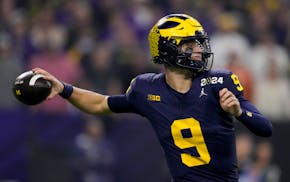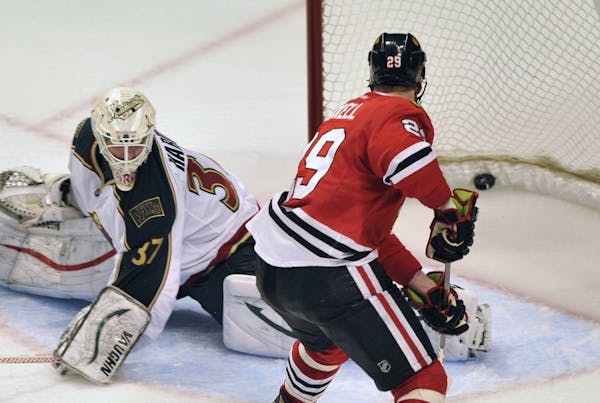There is no mainstream American sport that becomes as gloriously transformed during its postseason as hockey.
After five years of playoff abstinence, the Wild on Tuesday night provided a reminder of how the Stanley Cup playoffs are to the NHL regular season as Imax is to earbuds.
During a 2-1 overtime loss to Chicago at the United Center, the Wild's players conducted a 76-minute tutorial on what it means to play a game of brutal and sudden consequences.
Tuesday, there was no salvaging a point or waiting for the shootout. There were no staged fights between pseudo-skaters. There were players pushing through injuries, knowing that the reward for winning would be another two months of slashes and hip checks.
There was noise. Constant and deafening noise, from the time Jim Cornelison belted out the national anthem and United Center became a cauldron filled with red jerseys and throbbing eardrums.
"They have to pump something into the speakers there, because it's so loud,'' defenseman Ryan Suter said. "You look up in the crowd and everyone's singing.''
"That's pretty incredible, what they do during the anthem,'' forward Zach Parise said. "That's pretty awesome. I think we did a really good job of handling that. We played smart, we didn't give them quality chances early, and I think we did a good job of controlling the crowd. … When you can do that in that building, that's a good sign.''
The NHL playoffs magnify drama and heighten moments.
After starting Wild goaltender Niklas Backstrom injured himself in warm-ups, Josh Harding played brilliantly on short notice despite having spent the season undergoing treatment for multiple sclerosis.
Matt Cullen took a hit to his right leg and skated off the ice, grimacing, only to return a few minutes later. Mike Rupp broke a skate and crawled from the goalline to the bench. Mikko Koivu covered himself in ice after the game.
Ryan Suter played more than 41 minutes, and wound up making a pass one-handed, whether because of circumstance or a sore body part. In perhaps the greatest testament to the inspirational powers of playoff hockey, Pierre Marc-Bouchard threw a body check.
"I think that's one area where we need to continue to get better as a team,'' coach Mike Yeo said. "One thing I thought we did well was we played a good, structured game. But for me, one key is to take that structure and add a physical element to it.''
Physical play will increase whether the Wild is an instigator or not. The first game of a best-of-seven Stanley Cup playoff series provides a layer of bruising, an undercurrent of antagonism. As the series progresses, anger will become an accelerant.
Not that anyone was angry Wednesday. The Wild flew home from Chicago late Tuesday night, so everyone could sleep in their own beds.
Parise came to the interview room still wearing his skates, seemingly more enthralled by playoff hockey than discouraged by the loss.
"There are times when you're going to have a disappointing game, or a disappointing result to a game,'' he said. "You can't let it carry over.''
Suter walked out of Xcel Energy Center carrying his son, who was carrying a miniature hockey stick, on his shoulder.
"We're going to their building,'' he said. "We have to win one there. I mean, we're all excited to get playing again.''
With a rusty backup goalie pressed into duty, the Wild had several chances to win Game 1. Jason Zucker hit the inside of the left post, only to have the puck scoot behind Chicago goalie Corey Crawford without going into the net. Koivu and Parise took shots from the slot late in the third period and in overtime.
"I thought mine was in,'' Parise said.
Tuesday, the line between winning and losing was as thin and defined as a facial scar. Friday night, the Wild, having reminded Minnesotans what playoff hockey looks like, goes back for more.
Jim Souhan can be heard weekdays at noon and Sundays from 10-noon on 1500 ESPN. His Twitter name is @Souhan- Strib. • jsouhan@startribune.com

Souhan: These seven plays showcase Wolves' new defensive fire

Souhan: Wolves fans made Game 1 special. Now bring on Game 2.

Souhan: Should Vikings even consider McCarthy in NFL draft?

Souhan: NAW erases Suns' lead, Game 1 advantage with big performance


